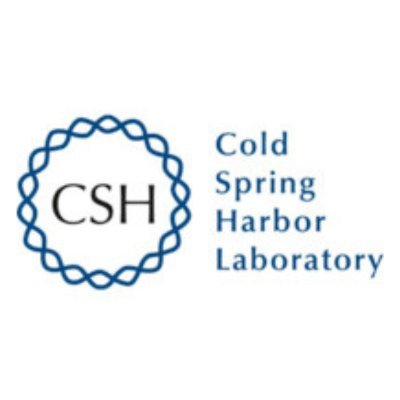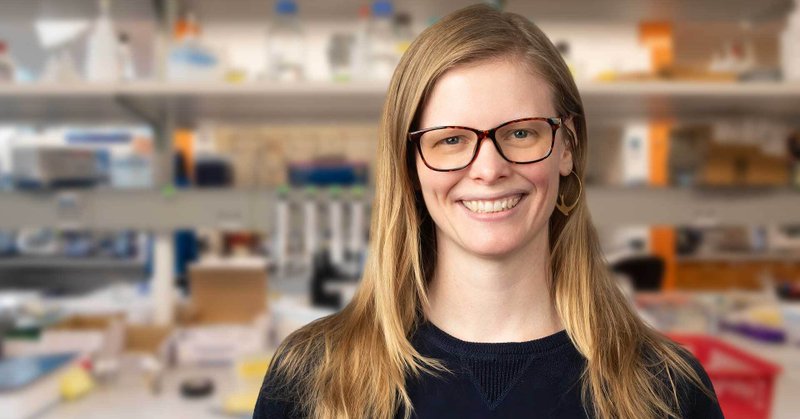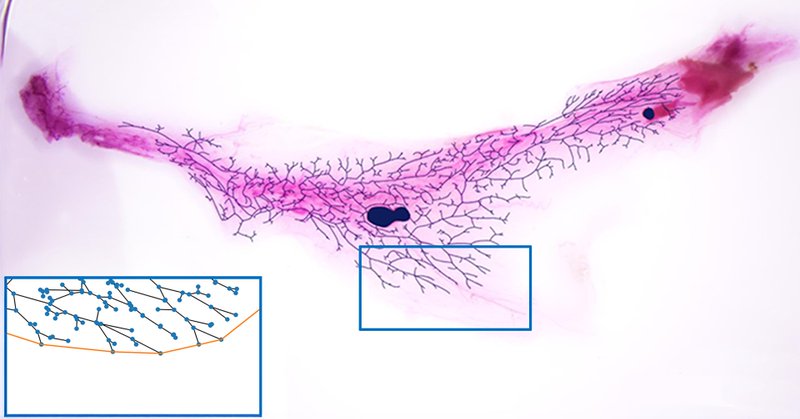
Cold Spring Harbor Laboratory
@CSHL
Followers
39K
Following
5K
Media
1K
Statuses
7K
Non-profit research and educational institution at the forefront of molecular biology, cancer, neuroscience, plant biology, and genetics.
Long Island, NY
Joined August 2009
CSHL Professor David Spector and grad student Disha Aggarwal examined tissue samples from a 59-year-old woman diagnosed with stage 1 triple-negative breast cancer. Their findings could help inform clinical trials of a drug targeting the long non-coding RNA MALAT1.
cshl.edu
When researchers look for potential cancer therapy targets, they typically go after protein-coding genes that participate in disease progression. Disrupt them and negate whatever role they play in...
0
0
2
It is with sadness that we acknowledge the passing of Dr. James Watson, Nobel prize-winning scientist and former Director and President of CSHL. We extend our sincere condolences to his wife Liz and family during this difficult time. We recognize Dr. Watson’s incredible
cshl.edu
Jim Watson made many contributions to science, education, public service, and especially Cold Spring Harbor Laboratory (CSHL). As a scientist, his and Francis Crick’s determination of the structure...
44
136
535
In this episode of "At the Lab", Phil Renna and Chris Vakoc, CSHL Deputy Director of the Cancer Center, sit down to discuss the tireless work researchers are doing to help patients and families alike. Listen now, wherever you get your podcasts:
cshl.edu
Pediatric cancer—two words that carry immense weight. For many, it’s a distant fear; for some, it’s a daily reality. And for my family, it became a devastating truth. After losing our teenage...
0
0
4
Congratulations to CSHL’s Kate Alexander for winning the @KidneyCancer Association’s 2025 Trailblazer Award! Could a tumor cell’s nuclear speckles one day help doctors figure out the best course of treatment? Alexander aims to find out. Read more at the link:
cshl.edu
Over 600,000 people in the United States are living with kidney or renal pelvis cancer. This year, over 80,000 new patients will be diagnosed. Could the speckles inside a tumor cell nucleus one day...
0
2
9
CSHL welcomes David Crotty, new executive director of @CSHLPress! Crotty, a 20+ year veteran of scientific publishing, succeeds founder John Inglis (@JohnRInglis), who has led the Press since 1987. Read more at the link:
cshl.edu
Cold Spring Harbor Laboratory (CSHL) has named David Crotty executive director of its publishing house, CSHL Press. He takes over for John Inglis, who founded the modern-day incarnation of CSHL Press...
0
1
5
This October, CSHL received a generous donation from the Friends of T.J. Foundation in support of sarcoma research. We are deeply grateful for their partnership and ongoing commitment to making life better through science.
0
0
3
A new study from CSHL’s Furukawa lab (@Lab_FURUKAWA) identifies the neurological ‘doorstops’ that keep the brain’s NMDA receptors fully or partially open. The findings could have implications for treating strokes and neurodegenerative conditions like #Alzheimers disease.
cshl.edu
As information zings from cell to cell inside the brain, bursts of electricity spur its transmission. At Cold Spring Harbor Laboratory (CSHL), scientists have turned their attention to the tiny pores...
1
4
10
What do humans and certain yeasts have in common? More than meets the eye! CSHL Professor Rob Martienssen has discovered how a protein passed down by our last shared ancestor LECA protects our DNA when transcription and replication collide. Check out the full story here:
cshl.edu
Could yeast and humans be any more different? Going by looks alone, probably not. But peering into our genomes reveals surprising similarities. That’s because we share a common ancestor called LECA...
0
0
2
Discover how cancer turns normal biology toxic at our monthly Cocktails & Chromosomes event, featuring Assistant Professor Peter Westcott. Visit our Eventbrite for more information and to RSVP:
eventbrite.com
Unleash your inner scientist and join us for an exciting evening at the intersection of cocktails and cutting-edge research!
0
0
0
This National Academy of Sciences Spotlight features Kornelia Polyak—renowned cancer biologist, newest member of CSHL’s Scientific Advisory Council, and Co-chair of CSHL’s Cancer Center’s External Advisory Committee. Read her insights on #BreastCancerResearch and mentorship:
nasonline.org
As we mark Breast Cancer Awareness Month this October, we celebrate the work of Kornelia Polyak, a pioneering cancer biologist and member of the National Academy of Sciences. For more than two...
0
0
0
In this special edition of At the Lab, CSHL Professor and Cancer Center member David Spector shares his lab’s most recent research and how collaborations with Northwell Health have been instrumental in his lab’s success.
cshl.edu
Today, the five-year survival rate for early-stage breast cancer is about 99%. Awareness drives detection. But what about those breast cancers that aren’t caught early? What about those that evade...
0
0
0
Breast cancer can sometimes come back with a vengeance. A new discovery from CSHL’s @caoresco lab could one day help prevent recurrence and keep breast tumors susceptible to common hormone therapy. #BreastCancerAwareness
cshl.edu
Know someone who’s been diagnosed with breast cancer? There’s a good chance that person has received hormone therapy. Estrogen receptor-positive (ER+) breast cancers account for about 75 percent of...
0
0
0
And the 2025 #LIBDC Business Award goes to...CSHL! The award recognizes CSHL’s role as a regional economic driver and beacon of discovery, innovation & community development. Read more here:
cshl.edu
Cold Spring Harbor Laboratory (CSHL) has received the Long Island Business Development Council’s 2025 Business Award. The distinction recognizes CSHL’s role as a regional economic driver and beacon...
0
0
2
“We could have published more if we had a more aggressive, short-term vision. And we would’ve failed the prostate cancer community if we’d given them something that sounded great but didn’t last.” CSHL Professor Lloyd Trotman reflects on his lab’s 20-year journey of discovery.
cshl.edu
As many as one in eight men in America will be diagnosed with prostate cancer at some point in their lives. About one in 44 will die from it. “Prostate cancer is very common,” Cold Spring Harbor...
0
0
2
Synesthesia, shipwrecks, and African elephant all await you in the smelliverse! Get a guided tour from CSHL Professor Alexei Koulakov in our Cocktails & Chromosomes video. #Neuroscience
0
0
2
Why is breast cancer no longer a death sentence? The answer lies with fundamental biology discoveries of the 20th century. Join us as we revisit one of these breakthroughs, which helped answer another crucial question: Why does cancer keep growing?
cshl.edu
Why do cancer cells keep dividing over and over? The answer can be found in fundamental biology breakthroughs of the late 20th century. In 1982, Cold Spring Harbor Laboratory (CSHL) geneticist...
0
1
7
CSHL Assistant Professor Katherine Alexander has been awarded a 2025 NIH Director’s New Innovator Award, which financially supports early career researchers to pursue creative, high-impact projects.
cshl.edu
Cold Spring Harbor Laboratory (CSHL) Assistant Professor Katherine Alexander has been awarded a 2025 NIH Director’s New Innovator Award. The grant provides Alexander with $475,000 per year for five...
0
0
2
Congratulations to Mary E. Brunkow, Fred Ramsdell, and Shimon Sakaguchi, awarded the 2025 Nobel Prize in Physiology or Medicine for discoveries that reshaped our understanding of immune regulation. CSHL is proud to have hosted and published work by these pioneering scientists.
0
0
6
Did you know that breasts have branches? Disturbances to this tree of life can have implications for breast cancer risk. Now, three grad students in CSHL's @caoresco lab have developed a computer model for measuring such changes. #BreastCancerAwareness
cshl.edu
Branching isn’t just for trees. This biological process occurs in animal development, enabling organs to perform complex functions. Branch-like structures form in lungs, kidneys, and breasts, among...
0
1
3
Early-onset cancers are on the rise—and scientists are racing to understand why. A new New York Times feature highlights research from CSHL Associate Professor Camila dos Santos on how pregnancy, breastfeeding, and even urinary tract infections can leave lasting marks on breast
nytimes.com
In the last decade, more than a dozen types of cancer have risen among people under 50. Scientists don’t have all of the answers, but research is starting to offer clues.
0
3
4


















